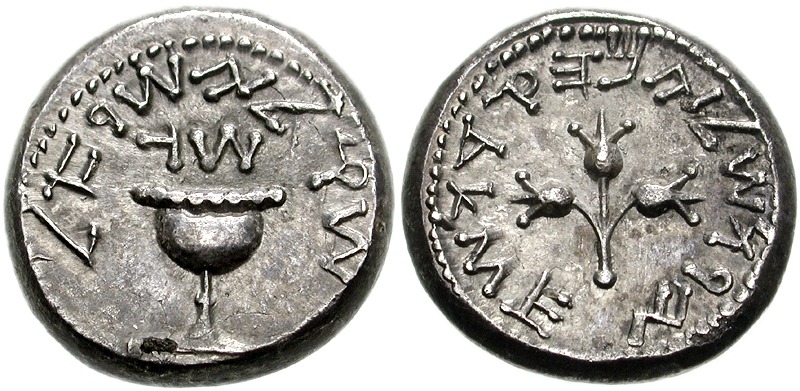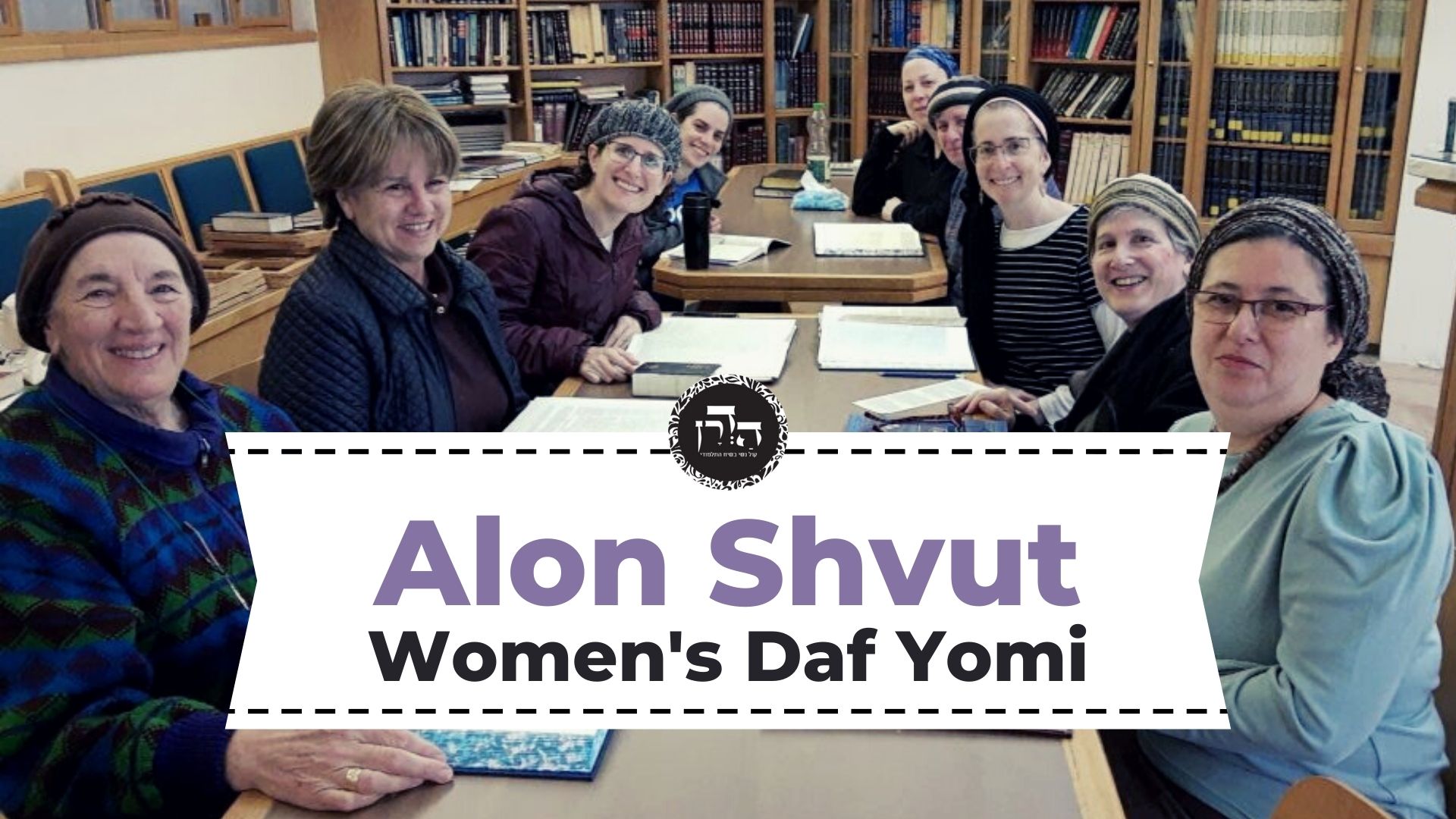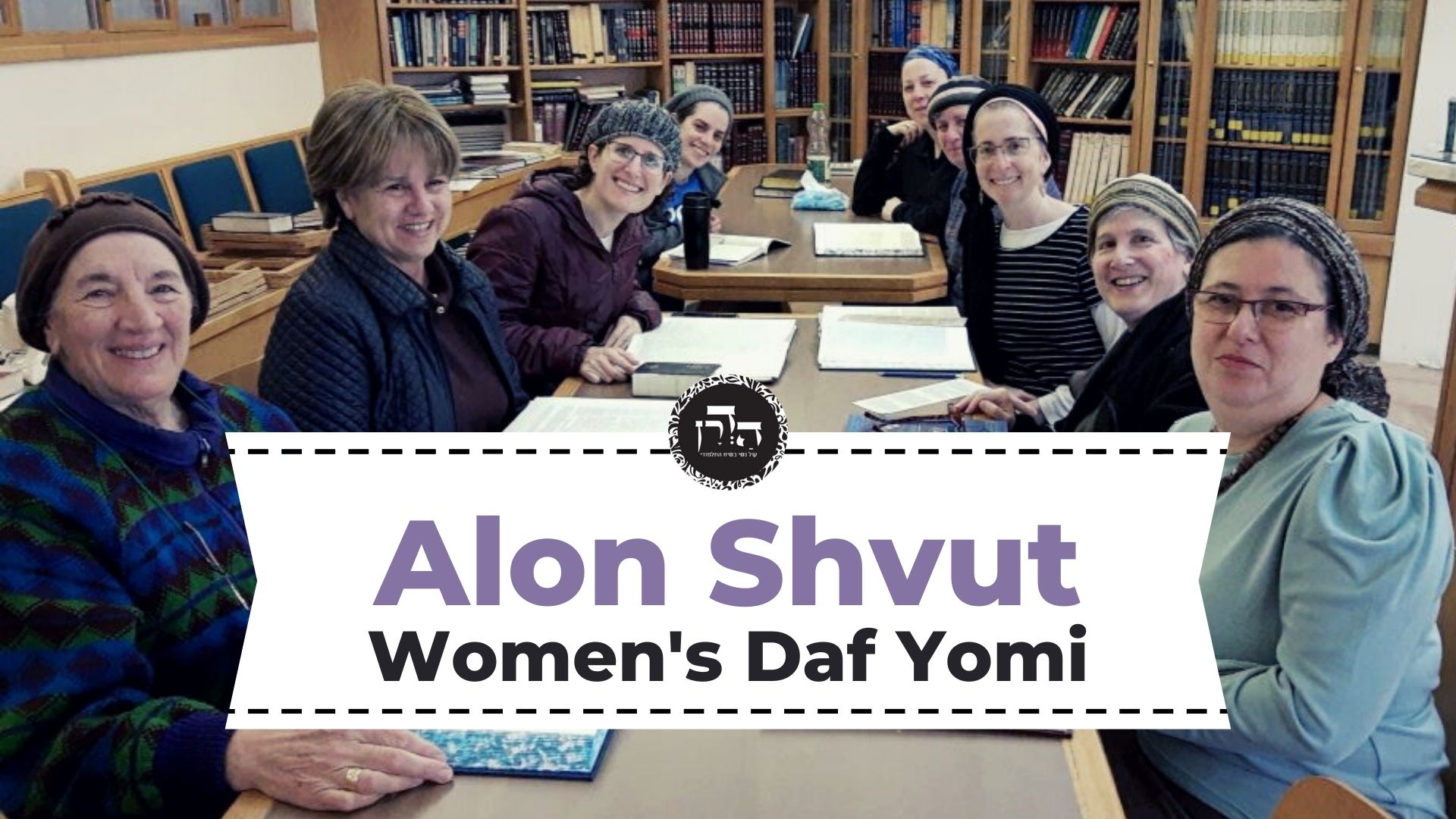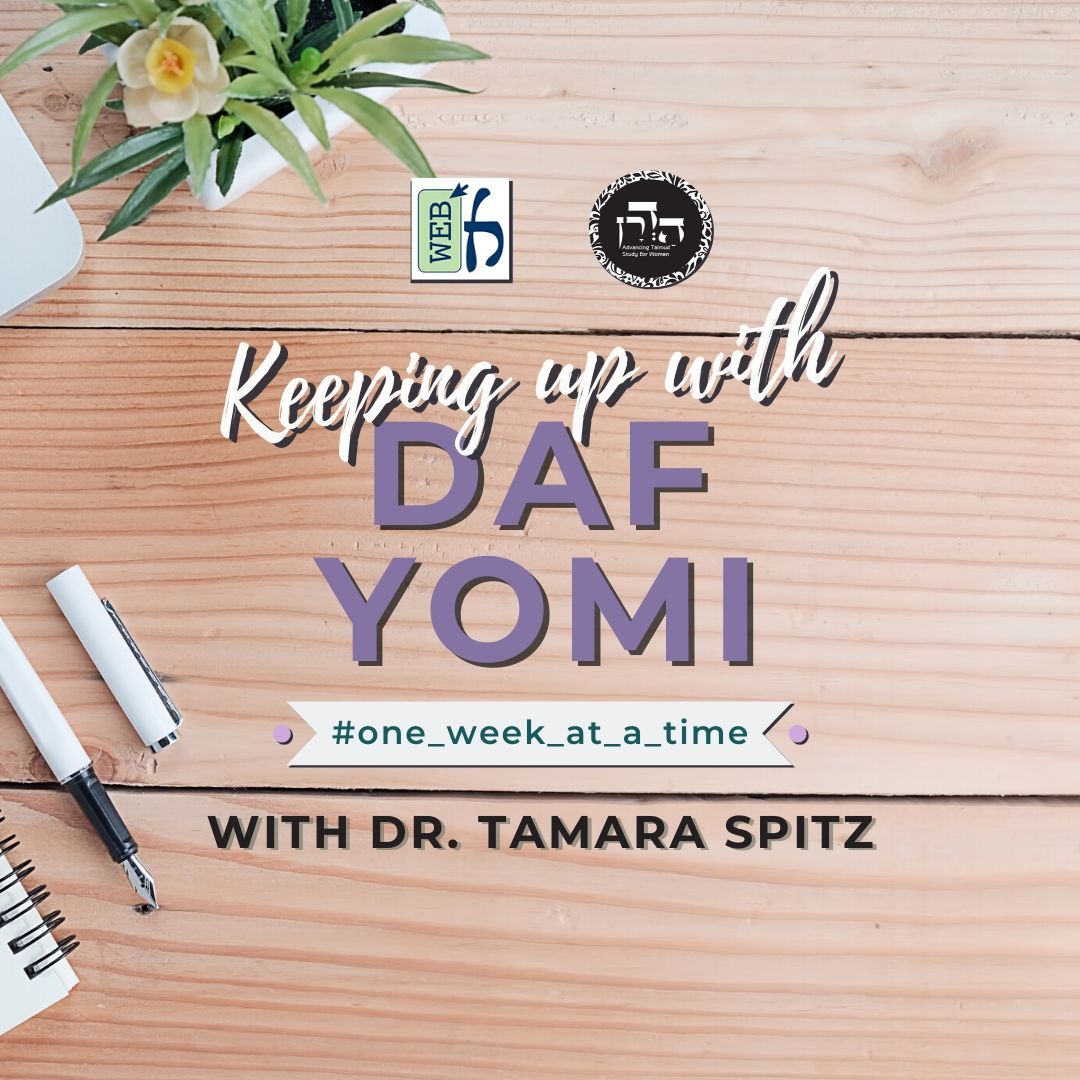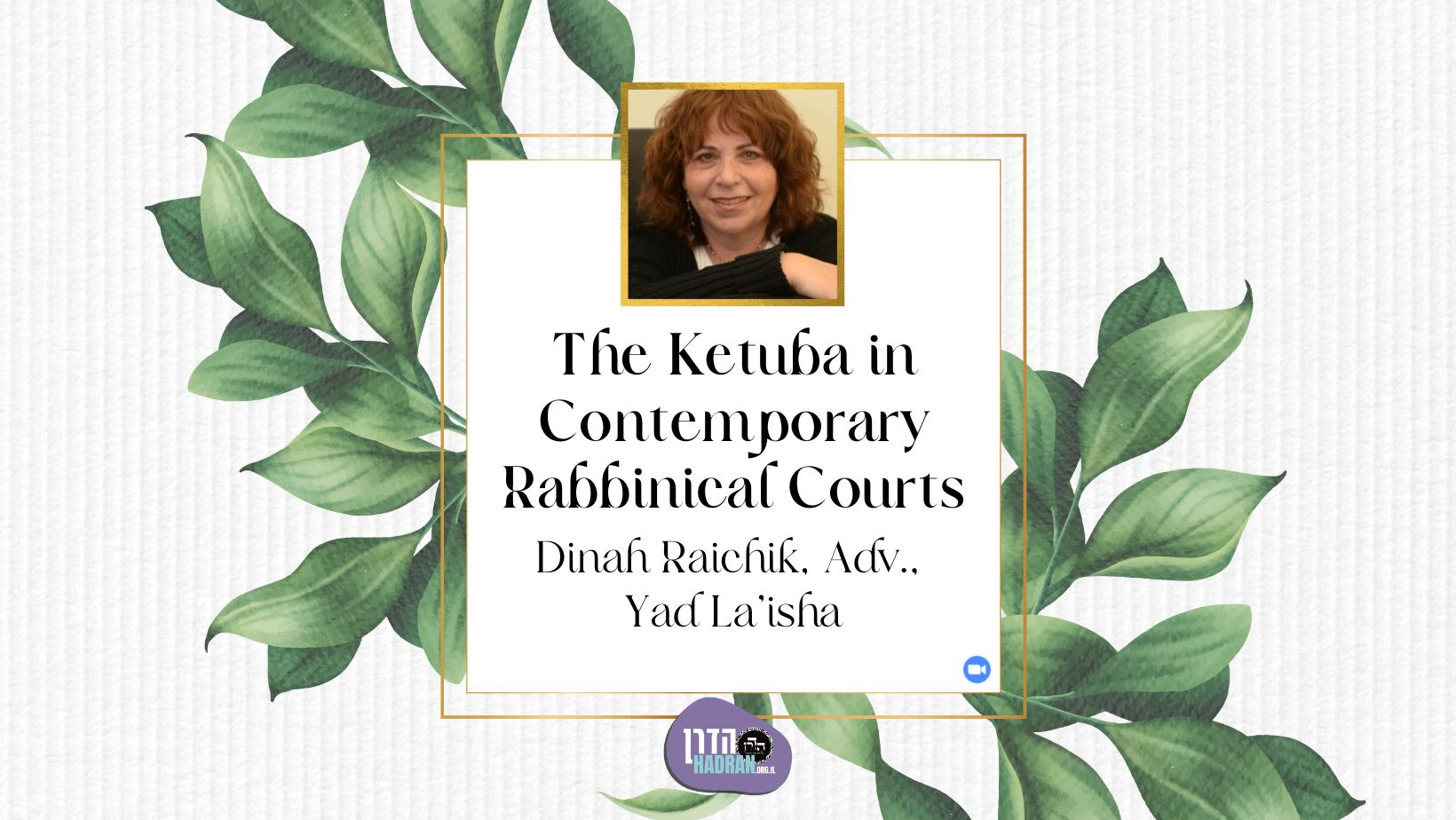If one redeems a donkey with a lamb and the lamb dies before it was given to the priest, is the owner responsible to replace it? What if the donkey died before the lamb was given? If one doesn’t redeem the donkey, one needs to break its neck – however redeeming is optimal. Other cases are brought where the Torah gives a number of possibilities but one option is more optimal. The second chapter deals with the firstborn of a kosher animal. Also exemptions are made if the fetus has some connection to non-Jewish ownership. The gemara digresses to discuss how acquiring movable items (kinyanim) from non-Jews is different from acquiring items from Jews.
This month’s learning is dedicated to the refuah shleima of our dear friend, Phyllis Hecht, גיטל פעשא בת מאשה רחל by all her many friends who love and admire her. Phyllis’ emuna, strength, and positivity are an inspiration.
Want to dedicate learning? Get started here:


Today’s daily daf tools:
This month’s learning is dedicated to the refuah shleima of our dear friend, Phyllis Hecht, גיטל פעשא בת מאשה רחל by all her many friends who love and admire her. Phyllis’ emuna, strength, and positivity are an inspiration.
Today’s daily daf tools:
Delve Deeper
Broaden your understanding of the topics on this daf with classes and podcasts from top women Talmud scholars.
New to Talmud?
Check out our resources designed to help you navigate a page of Talmud – and study at the pace, level and style that fits you.
The Hadran Women’s Tapestry
Meet the diverse women learning Gemara at Hadran and hear their stories.
Bekhorot 13
רַב שֵׁשֶׁת אָמַר: לוֹמַר שֶׁאֵינוֹ עוֹבֵר עָלָיו.
Rav Sheshet says: The mitzva of redeeming a firstborn donkey takes effect immediately after it is born, as is stated in the first baraita. The second baraita, which states that it applies only after thirty days, means to say that until that time, one does not transgress a prohibition if he has not yet performed the redemption. After thirty days, though, one transgresses a prohibition if he still has not redeemed his firstborn donkey.
מֵתִיב רָמֵי בַּר חָמָא: מִצְוָתוֹ כׇּל שְׁלֹשִׁים יוֹם, מִכָּאן וְאֵילָךְ — אוֹ פּוֹדֵהוּ אוֹ עוֹרְפוֹ. מַאי לָאו מִצְוָה לְשַׁהוֹתוֹ כׇּל שְׁלֹשִׁים יוֹם? לָא, מִצְוָה לִפְדּוֹתוֹ כׇּל שְׁלֹשִׁים יוֹם.
Rami bar Ḥama raises an objection to Rav Sheshet from a baraita: The mitzva of a firstborn donkey applies throughout the period of thirty days from its birth; from that point forward he must either redeem it immediately or break its neck. What, does it not mean that there is a mitzva to wait to redeem it until all thirty days have passed? The Gemara answers: No, it means that there is a mitzva to redeem it throughout the period of thirty days, and after that point one has transgressed a prohibition.
אִי הָכִי, ״מִכָּאן וְאֵילָךְ אוֹ פּוֹדֵהוּ אוֹ עוֹבֵר עָלָיו״ מִיבְּעֵי לֵיהּ! אֶלָּא אָמַר רָבָא: לָא קַשְׁיָא, הָא רַבִּי אֱלִיעֶזֶר דְּמַקֵּשׁי, הָא רַבָּנַן דְּלָא מַקְּשִׁי.
The Gemara asks: If so, it should have stated: From that point forward, either he redeems it or he transgresses a prohibition, rather than stating: From that point forward he must either redeem it or break its neck. Rather, Rava says: The contradiction between the two baraitot is not difficult, as this baraita, which states that the redemption is performed after thirty days, is in accordance with the opinion of Rabbi Eliezer, who compares the redemption of a firstborn donkey to the redemption of a woman’s firstborn son, where it is stated: “From a month old shall you redeem them” (Numbers 18:16). That baraita, which states that one must perform the mitzva immediately, is in accordance with the opinion of the Rabbis, who do not compare the two mitzvot of redemption.
מַתְנִי׳ לֹא רָצָה לִפְדּוֹתוֹ — עוֹרְפוֹ מֵאֲחוֹרָיו וְקוֹבְרוֹ. מִצְוַת הַפְּדִיָּיה קוֹדֶמֶת לְמִצְוַת עֲרִיפָה, שֶׁנֶּאֱמַר: ״אִם לֹא תִפְדֶּה וַעֲרַפְתּוֹ״.
MISHNA: If one did not wish to redeem the firstborn donkey, he breaks its neck from behind and buries it. The mitzva of redeeming the firstborn donkey takes precedence over the mitzva of breaking the neck, as it is stated: “If you will not redeem it, then you shall break its neck” (Exodus 13:13).
מִצְוַת יְעִידָה קוֹדֶמֶת לְמִצְוַת הַפְּדִיָּיה, שֶׁנֶּאֱמַר: ״אֲשֶׁר לֹא יְעָדָהּ וְהֶפְדָּהּ״.
The mishna proceeds to enumerate other mitzvot in which one option takes precedence over another. The mitzva of designating a Hebrew maidservant to be betrothed to her master takes precedence over the mitzva of redeeming the maidservant from her master with money, as it is stated: “If she does not please her master, who has not betrothed her to himself, then he shall let her be redeemed” (Exodus 21:8).
מִצְוַת הַיִּיבּוּם קוֹדֶמֶת לְמִצְוַת חֲלִיצָה, בָּרִאשׁוֹנָה שֶׁהָיוּ מִתְכַּוְּונִין לְשֵׁם מִצְוָה, וְעַכְשָׁיו שֶׁאֵין מִתְכַּוְּונִין לְשֵׁם מִצְוָה, אָמְרוּ: מִצְוַת חֲלִיצָה קוֹדֶמֶת לְמִצְוַת יִבּוּם.
The mitzva of levirate marriage takes precedence over the mitzva of ḥalitza, which dissolves the levirate bond, as it is stated: “And if the man does not wish to take his brother’s wife” (Deuteronomy 25:7). The mishna adds: This was the case initially, when people would intend that their performance of levirate marriage be for the sake of the mitzva. But now that they do not intend that their performance of levirate marriage be for the sake of the mitzva, but rather for reasons such as the beauty of the yevama or for financial gain, the Sages said that the mitzva of ḥalitza takes precedence over the mitzva of levirate marriage.
מִצְוַת הַגְּאוּלָּה בָּאָדוֹן, הוּא קוֹדֵם לְכׇל אָדָם, שֶׁנֶּאֱמַר: ״וְאִם לֹא יִגָּאֵל וְנִמְכַּר בְּעֶרְכֶּךָ״.
With regard to a non-kosher animal that was consecrated to the Temple, the mitzva of redemption by the owner who consecrated it takes precedence over redemption by any other person, as it is stated: “And if it is of a non-kosher animal…and if it is not redeemed, it shall be sold according to your valuation” (Leviticus 27:27).
הֲדַרַן עֲלָךְ הַלּוֹקֵחַ עוּבַּר חֲמוֹרוֹ.
מַתְנִי׳ הַלּוֹקֵחַ עוּבַּר פָּרָתוֹ שֶׁל נׇכְרִי, וְהַמּוֹכֵר לוֹ, אַף עַל פִּי שֶׁאֵינוֹ רַשַּׁאי, וְהַמִּשְׁתַּתֵּף לוֹ, וְהַמְקַבֵּל מִמֶּנּוּ, וְהַנּוֹתֵן לוֹ בְּקַבָּלָה — פָּטוּר מִן הַבְּכוֹרָה, שֶׁנֶּאֱמַר ״בְּיִשְׂרָאֵל״, אֲבָל לֹא בַּאֲחֵרִים.
MISHNA: With regard to one who purchases the fetus of a cow that belongs to a gentile; one who sells the fetus of his cow to a gentile, even though one is not permitted to sell a large animal to a gentile; one who enters into a partnership with a gentile with regard to a cow or its fetus; one who receives a cow from a gentile to tend to it in exchange for partnership in its offspring; and one who gives his cow to a gentile in receivership, so that the gentile owns a share of the cow’s offspring; in all of these cases, one is exempt from the obligation of redeeming the firstborn offspring, as it is stated: “I sanctified to Me all the firstborn in Israel, both man and animal” (Numbers 3:13), indicating that the mitzva is incumbent upon the Jewish people, but not upon others. If the firstborn belongs even partially to a gentile, the sanctity of firstborn does not apply to it.
הַכֹּהֲנִים וְהַלְוִיִּם חַיָּיבִים, שֶׁלֹּא נִפְטְרוּ מִבְּכוֹר בְּהֵמָה טְהוֹרָה, אֶלָּא מִפִּדְיוֹן הַבֵּן וּמִפֶּטֶר חֲמוֹר.
The mishna continues: The priests and the Levites are obligated in the mitzva, i.e., their animals have firstborn sanctity, as they were not exempted from the mitzva of the male firstborn of a kosher animal; rather, they were exempted only from redemption of the firstborn son and from the redemption of the firstborn donkey.
גְּמָ׳ מַאי אִירְיָא דְּתָנֵי עוּבַּר חֲמוֹרוֹ בְּרֵישָׁא, וַהֲדַר תָּנֵי עוּבַּר פָּרָתוֹ? לִיתְנֵי בְּרֵישָׁא עוּבַּר פָּרָתוֹ, דִּקְדוּשַּׁת הַגּוּף הוּא, וַהֲדַר לִיתְנֵי עוּבַּר חֲמוֹרוֹ, דִּקְדוּשַּׁת דָּמִים הוּא.
GEMARA: The first chapter of this tractate began with the halakhot pertaining to a firstborn donkey. The Gemara asks: Why does the tanna specifically teach the halakhot of the fetus of his donkey first, and only then teach the halakhot of the fetus of his cow? Let him first teach the halakhot of the fetus of his cow, as it is a case of inherent sanctity, i.e., the animal cannot be redeemed and is sacrificed upon the altar, and let him then teach the halakhot of the fetus of his donkey, as it is a case of sanctity that inheres in its value.
אָמְרִי בְּמַעְרְבָא: אִיבָּעֵית אֵימָא, אַיְּידֵי דַּחֲבִיבָא לֵיהּ, כִּדְרַבִּי חֲנִינָא, וְאִי בָּעֵית אֵימָא, אַיְּידֵי דְּזוּטְרָן מִילֵּיהּ דִּבְהֵמָה טְמֵאָה, פָּסֵיק וְשָׁדֵי לַהּ.
They said in the West, Eretz Yisrael: If you wish, say that the halakhot of a firstborn donkey were taught first since they are dear to the tanna, in accordance with the statement of Rabbi Ḥanina (5b) that donkeys helped the Jews when they departed from Egypt, as the Jews loaded their gold and silver on donkeys. And if you wish, say that these halakhot were taught first since the matters pertaining to a non-kosher animal are relatively few, and therefore the tanna completes its treatment and sets it aside.
אָמַר רַבִּי יִצְחָק בַּר נַחְמָנִי אָמַר רֵישׁ לָקִישׁ מִשּׁוּם רַבִּי אוֹשַׁעְיָא: יִשְׂרָאֵל שֶׁנָּתַן מָעוֹת לְגוֹי בִּבְהֶמְתּוֹ בְּדִינֵיהֶם, אַף עַל פִּי שֶׁלֹּא מָשַׁךְ — קָנָה, וְחַיֶּיבֶת בִּבְכוֹרָה. וְגוֹי שֶׁנָּתַן מָעוֹת לְיִשְׂרָאֵל בִּבְהֶמְתּוֹ בְּדִינֵיהֶם, אַף עַל פִּי שֶׁלֹּא מָשַׁךְ — קָנָה, וּפָטוּר מִן הַבְּכוֹרָה.
§ With regard to the mishna’s discussion of sales involving Jews and gentiles, Rabbi Yitzḥak bar Naḥmani says that Reish Lakish said in the name of Rabbi Oshaya: In the case of a Jew who gave money to a gentile to buy the gentile’s animal from him according to their laws, as explained further on, even though the Jew did not pull the animal in the manner of a formal acquisition, as required by halakha, he has legally acquired it, and the Jewish owner is obligated to give the animal’s firstborn offspring to a priest. And in the case of a gentile who gave money to a Jew to buy the Jew’s animal from him according to their laws, even though the gentile did not pull the animal he has acquired it, and the Jew is therefore exempt from giving the animal’s firstborn offspring to a priest.
אָמַר מָר: יִשְׂרָאֵל שֶׁנָּתַן מָעוֹת לְגוֹי בְּדִינֵיהֶם, אַף עַל פִּי שֶׁלֹּא מָשַׁךְ — קָנָה וְחַיֶּיבֶת בִּבְכוֹרָה.
The Master said: In the case of a Jew who gave money to a gentile to buy the gentile’s animal from him according to their laws, even though he did not pull the animal he has legally acquired it, and the Jew is obligated to give the animal’s firstborn offspring to a priest.
מַאי ״בְּדִינֵיהֶם״? אִי נֵימָא בְּדִינֵיהֶם דְּגוּפֵיהּ, דְּאָתֵי בְּקַל וָחוֹמֶר: אִם גּוּפֵיהּ קָנֵי לֵיהּ יִשְׂרָאֵל בְּכֶסֶף, דִּכְתִיב ״לָרֶשֶׁת אֲחוּזָּה״,
The Gemara asks: What is meant by: According to their laws? If we say that it is referring to the laws relating to the purchase of a gentile’s person as a slave, i.e., the halakhot of purchasing gentiles themselves rather than the methods by which gentiles can acquire property, this must be based on the assumption that the halakha with regard to the purchase of a gentile’s animal is derived by the following a fortiori inference: If a gentile’s person is acquired by a Jew as a Canaanite slave through payment of money, as it is written: “And you may make them an inheritance for your children after you, to hold for an ancestral possession” (Leviticus 25:46), the same halakha should apply to acquiring a gentile’s property.
הִקִּישׁוֹ הַכָּתוּב לַאֲחוּזָּה, מָה אֲחוּזָּה נִקְנֵית בְּכֶסֶף וּבִשְׁטָר וּבַחֲזָקָה, אַף עֶבֶד כְּנַעֲנִי נִקְנֶה בְּכֶסֶף. מָמוֹנוֹ — לֹא כׇּל שֶׁכֵּן הוּא?
The Gemara elaborates: The verse thereby compares a gentile slave to an ancestral possession, i.e., land: Just as an ancestral possession is acquired by the transfer of money, or with a bill of sale, or through taking possession, so too, a Canaanite slave is acquired by the transfer of money. If this is the halakha with regard to a gentile’s person, is it not all the more so reasonable that a gentile’s property is acquired through the transfer of money?
אִם כֵּן, אֲפִילּוּ בִּשְׁטָר וּבַחֲזָקָה נָמֵי! וְעוֹד, יִשְׂרָאֵל מִיִּשְׂרָאֵל יוֹכִיחַו, דְּגוּפֵיהּ קָנֵי לֵיהּ בְּכֶסֶף, מָמוֹנוֹ בִּמְשִׁיכָה!
The Gemara rejects this conclusion: If so, then according to halakha it should be possible to acquire a gentile’s property even with a bill of sale or by taking possession, which is not so. The Gemara adds: And furthermore, the halakha pertaining to a Jew purchasing goods from a Jew proves that the entire premise of the a fortiori inference is false, as he acquires a Jew’s person with money alone, but he acquires his property only by pulling. It is therefore evident that the ability to acquire one’s person with money does not indicate that his property can be purchased in the same manner.
אֶלָּא אָמַר אַבָּיֵי: בְּדִינֵיהֶם שֶׁפָּסְקָה לָהֶם תּוֹרָה, ״אוֹ קָנֹה מִיַּד עֲמִיתֶךָ״ — מִיַּד עֲמִיתֶךָ הוּא דְּבִמְשִׁיכָה, הָא מִיַּד גּוֹי בְּכֶסֶף.
Rather, Abaye says that the term: Their laws, is referring to their laws that the Torah prescribed for their methods of purchase, by stating: “Or buy of your counterpart’s hand” (Leviticus 25:14), which teaches that it is only from the hand of your counterpart, i.e., a Jew, that property is acquired by the formal act of acquisition of pulling. This indicates that acquiring property from the hand of a gentile is accomplished through payment of money.
וְאֵימָא: מִיַּד גּוֹי — כְּלָל כְּלָל לָא! אָמְרִי: לָא סָלְקָא דַּעְתָּךְ, קַל וָחוֹמֶר הוּא — אִם גּוּפוֹ קוֹנֶה, מָמוֹנוֹ לֹא כׇּל שֶׁכֵּן?
The Gemara raises an objection: But one can say that it should be inferred from the verse that one cannot purchase anything at all from the hand of a gentile. The Sages said in response: That cannot enter your mind, as there is an a fortiori inference which indicates otherwise: If a Jew can purchase a gentile’s person as a slave, is it not all the more so reasonable that he can purchase a gentile’s property?
וְאֵימָא: מִיַּד גּוֹי — עַד דְּאִיכָּא תַּרְתֵּי! אָמְרִי: וְלָאו קַל וָחוֹמֶר הוּא? גּוּפוֹ בְּאַחַת, מָמוֹנוֹ בִּשְׁתַּיִם?! וְאֵימָא: אוֹ בְּהָא אוֹ בְּהָא, דּוּמְיָא דַּ״עֲמִיתֶךָ״.
The Gemara raises another objection: But one can say that the verse teaches that whereas a Jew’s property is acquired through pulling, property purchased from the hand of a gentile is not acquired until two formal acts of acquisition have been performed, both pulling and payment of money. The Sages said in response: Isn’t it indicated otherwise by an a fortiori inference: If his person is acquired through only one act of acquisition, could it be that his property must be acquired through two acts? The Gemara further suggests: But one can say that it is derived from the verse that one can acquire property from a gentile either through this method of pulling or through that method of money. The Gemara explains: The halakha derived from the phrase “of your counterpart” must be similar to an acquisition from your counterpart:
מָה ״עֲמִיתֶךָ״ בַּחֲדָא, אַף גּוֹי נָמֵי בַּחֲדָא.
Just as from the hand of your counterpart it is with one act, with pulling, so too, from the hand of a gentile, it is also with one act, with money.
אָמַר מָר: וְגוֹי שֶׁנָּתַן מָעוֹת לְיִשְׂרָאֵל בִּבְהֶמְתּוֹ בְּדִינֵיהֶן, אַף עַל פִּי שֶׁלֹּא מָשַׁךְ — קָנָה, וּפָטוּר מִן הַבְּכוֹרָה. מַאי בְּדִינֵיהֶן? אִילֵּימָא בְּדִינֵיהֶן דְּגוּפֵיהּ, מִשּׁוּם דְּאָתֵי בְּקַל וָחוֹמֶר: אִם גּוּפוֹ יִשְׂרָאֵל קָנֵי לֵיהּ בְּכֶסֶף, דִּכְתִיב ״מִכֶּסֶף מִקְנָתוֹ״, מָמוֹנוֹ לֹא כׇּל שֶׁכֵּן?
The Gemara discusses the statement of Rabbi Oshaya. The Master said: And a gentile who gave money to a Jew to buy the Jew’s animal from him according to their laws, even though the gentile did not pull the animal he has acquired it, and the Jew is therefore exempt from giving the animal’s firstborn offspring to a priest. The Gemara clarifies: What is the meaning of according to their laws? If we say that it means: According to their laws of the person of the Jew himself, i.e., the manner in which he purchases the person of a Jew with money, and it is reasonable to say so, as it may be derived through an a fortiori inference: If a gentile acquires the body of a Jew with money, as it is written in that regard: “From the money of his purchase” (Leviticus 25:51), then with regard to the property of a Jew, is it not all the more so reasonable that the gentile can acquire it with money?
יִשְׂרָאֵל מִיִּשְׂרָאֵל יוֹכִיחַו, דְּגוּפוֹ קָנֵי בְּכֶסֶף, מָמוֹנוֹ בִּמְשִׁיכָה! אֶלָּא אָמַר אַבָּיֵי: בְּדִינֵיהֶם שֶׁפָּסְקָה לָהֶם תּוֹרָה, ״וְכִי תִמְכְּרוּ מִמְכָּר לַעֲמִיתֶךָ״ — לַעֲמִיתֶךָ בִּמְשִׁיכָה, הָא לְגוֹי בְּכֶסֶף.
This can be rejected, as the acquisition of a Jew from a Jew will prove that the inference is not valid, as the person of a Hebrew slave one acquires with money, while the property of a Jew can be acquired only by pulling. Rather, Abaye said: That which it states, that a gentile purchases an animal with money according to their laws, means: With the acts of acquisition that the Torah prescribed to gentiles, the manner in which they acquire items from Jews, i.e., with money, as it is stated: “And if you sell a sale item to your counterpart” (Leviticus 25:14), from which it may be inferred: To your counterpart, i.e., a Jew, property is acquired by pulling, but property from the hand of a gentile is acquired with money.
וְאֵימָא: לְגוֹי כְּלָל כְּלָל לָא! אָמְרִי: לָאו קַל וָחוֹמֶר הוּא? אִם גּוּפוֹ קָנָה, מָמוֹנוֹ לֹא כׇּל שֶׁכֵּן?
The Gemara suggests: But say that the inference should be: To a gentile, not at all, i.e., neither with money nor with pulling can a gentile acquire an item from a Jew. The Sages said in response: But isn’t it an a fortiori inference to the contrary: If a gentile can purchase a Jew’s person as a slave, then is it not all the more so reasonable that he can purchase the Jew’s property?
אֵימָא: לְגוֹי עַד דְּאִיכָּא תַּרְתֵּי! לָאו קַל וָחוֹמֶר הוּא? גּוּפוֹ בְּאֶחָד, מָמוֹנוֹ בִּשְׁתַּיִם?!
The Gemara suggests: Say and infer as follows: To your counterpart you sell with pulling, but to a gentile you do not sell until two formal acts of acquisition have been performed: Pulling and money. The Sages said in response: But isn’t it an a fortiori inference to the contrary: If the person of a Jew is acquired with one act of acquisition, is it reasonable that his property is acquired with two acts?
וְאֵימָא: אוֹ בְּהָא אוֹ בְּהָא, דּוּמְיָא דַּ״עֲמִיתֶךָ״;
The Gemara further suggests: But say that a gentile acquires property from a Jew either with this act of pulling or with that act of paying money. The Gemara explains: The acquisition of the gentile must be similar to the acquisition of your counterpart, from which it is derived:
מָה ״עֲמִיתֶךָ״ בְּאַחַת, אַף גּוֹי נָמֵי בְּאַחַת.
Just as property is acquired from your counterpart through only one act of acquisition, i.e., pulling, so too, property is acquired from a gentile through only one act of acquisition, i.e., payment of money.
אָמְרִי: וּלְאָמֵימָר דְּאָמַר מְשִׁיכָה בְּגוֹי קוֹנָה, הָנִיחָא אִי סָבַר לַהּ כְּרַבִּי יוֹחָנָן דְּאָמַר: דְּבַר תּוֹרָה מָעוֹת קוֹנוֹת, מְשִׁיכָה לֹא, אַהֲנִי ״לַעֲמִיתֶךָ״ — לַעֲמִיתֶךָ בְּכֶסֶף, לְגוֹי בִּמְשִׁיכָה.
The Sages said: And according to the opinion of Ameimar, who says that pulling effects acquisition in the case of a gentile, this works out well if he holds in accordance with the opinion of Rabbi Yoḥanan, who says: By Torah law, money effects acquisition, but pulling does not. If Ameimar accepts Rabbi Yoḥanan’s opinion, then it can be derived from the phrase “of your counterpart” that transactions with your counterpart, i.e., a Jew, are effected through payment of money, whereas transactions with a gentile are effected by pulling.
אֶלָּא אִי סָבַר לַהּ כְּרֵישׁ לָקִישׁ, דְּאָמַר: מְשִׁיכָה מְפוֹרֶשֶׁת מִן הַתּוֹרָה, לַעֲמִיתֶךָ בִּמְשִׁיכָה, וּלְגוֹי בִּמְשִׁיכָה, ״לַעֲמִיתֶךָ״ לְמָה לִי?
But if Ameimar holds in accordance with the opinion of Reish Lakish, who says: The act of acquisition of pulling is explicit in the Torah, then the halakha is that transactions with your counterpart are effected by pulling, and transactions with a gentile are also effected by pulling. Accordingly, why do I need the phrase “of your counterpart”?
אָמְרִי: לַעֲמִיתֶךָ אַתָּה מַחְזִיר אוֹנָאָה, וְאִי אַתָּה מַחֲזִיר אוֹנָאָה לְגוֹי. לְגוֹי — מֵ״אַל תּוֹנוּ אִישׁ אֶת אָחִיו״ נָפְקָא!
The Sages said in explanation: The phrase “of your counterpart” does not teach a halakha with regard to the method of acquisition. Rather, it is referring to the latter part of the verse: “And if you make a sale to your counterpart, or buy of your counterpart’s hand, a man shall not exploit his brother” (Leviticus 25:14). The verse is derived as follows: You must return the sum of exploitation to your counterpart, but you do not need to return the sum of exploitation to a gentile. The Gemara rejects this suggestion: The exemption from returning the sum of exploitation to a gentile is derived from the latter part of the verse alone: “A man shall not exploit his brother.” A gentile is not included in the category of “his brother.” Accordingly, the phrase “of your counterpart” remains extraneous.
חַד בְּגוֹי, וְחַד בְּהֶקְדֵּשׁ, וּצְרִיכִי, דְּאִי כְּתַב רַחֲמָנָא חַד — הֲוָה אָמֵינָא: לְגוֹי הוּא דְּאֵין לוֹ אוֹנָאָה, אֲבָל הֶקְדֵּשׁ — יֵשׁ לוֹ אוֹנָאָה, קָא מַשְׁמַע לַן.
The Gemara responds: One phrase is required to exclude a gentile, and one serves to exclude consecrated property. And both derivations are necessary, as, had the Merciful One written only one exclusionary phrase, I would say: It is with regard to transactions with a gentile that one is not subject to the prohibition of exploitation; but with regard to transactions involving consecrated property, one is subject to the prohibition of exploitation. Therefore, the other derivation teaches us that one is not subject to the prohibition of exploitation with regard to transactions involving consecrated property either.
הָנִיחָא לְמַאן דְּאָמַר גְּזֵילוֹ אָסוּר — הַיְינוּ דְּאִצְטְרִיךְ קְרָא לְמִישְׁרֵי אוֹנָאָה, אֶלָּא אִי סָבַר לַהּ כְּמַאן דְּאָמַר גְּזֵילוֹ שֶׁל גּוֹי מוּתָּר, אוֹנָאָה מִיבַּעְיָא? אָמְרִי: אִי סָבַר לַהּ כְּמַאן דְּאָמַר גְּזֵילוֹ מוּתָּר — עַל כּוּרְחָיךְ כְּרַבִּי יוֹחָנָן סְבִירָא לֵיהּ.
The Gemara remarks: This works out well according to the one who says that his robbery, i.e., robbing a gentile, is prohibited, as this is the reason that a verse is necessary to permit keeping the sum of the exploitation obtained from a gentile. But if Ameimar holds in accordance with the opinion of the one who says that his robbery is permitted, is it necessary to state that one may keep the sum of the exploitation obtained from a gentile? The Gemara accepts this reasoning: The Sages said: If Ameimar holds in accordance with the opinion of the one who says that his robbery is permitted, perforce he holds in accordance with the opinion of Rabbi Yoḥanan that money effects acquisition by Torah law, and therefore the difficulty does not arise.
מֵיתִיבִי: הַלּוֹקֵחַ גְּרוּטָאוֹת מִן הַגּוֹיִם, וּמָצָא בָּהֶן עֲבוֹדָה זָרָה — אִם עַד שֶׁלֹּא נָתַן מָעוֹת מָשַׁךְ — יַחֲזִיר, וְאִם מִשֶּׁנָּתַן מָעוֹת מָשַׁךְ — יוֹלִיךְ הֲנָאָה לְיָם הַמֶּלַח.
§ The Gemara raises an objection to the opinion that property is acquired from a gentile by monetary payment. It is taught in a baraita: With regard to one who buys broken vessels [gerutaot] made of gold or silver from the gentiles and finds among them an object of idol worship, if he pulled the object of idol worship, thereby performing an act of acquisition, before he gave the money to the gentile, he may return the object of idol worship to the gentile. But if he pulled it after he gave the money to the gentile, he may not return it. Since the idol’s status was not revoked, he must take it and cast it into the Dead Sea.
וְאִי אָמְרַתְּ מָעוֹת קוֹנוֹת, מְשִׁיכָה לְמָה לִּי? הָכָא בְּמַאי עָסְקִינַן — שֶׁקִּיבֵּל עָלָיו לָדוּן בְּדִינֵי יִשְׂרָאֵל. אִי הָכִי, מָעוֹת לְמָה לִי? הָכִי קָאָמַר: אַף עַל פִּי שֶׁנָּתַן מָעוֹת, אִי מָשֵׁיךְ — אִין, וְאִי לָא — לָא.
The Gemara explains the difficulty: And if you say that payment of money acquires items from gentiles, why do I need pulling in order to effect the Jew’s acquisition of the idol? The Gemara answers: Here we are dealing with a case where the gentile accepted upon himself to have this transaction adjudicated by Jewish law. The Gemara raises an objection: If so, why do I need the payment of money in order to effect the Jew’s acquisition of the idol? Pulling alone should be enough, in accordance with halakha. The Gemara explains that this is what the baraita means: Even though the Jew gave money to the gentile, the halakha still depends on the act of pulling: If he pulled the broken vessels, yes, he has acquired them, and if not, he has not acquired them.
אִי הָכִי, קַשְׁיָא רֵישָׁא! אָמַר אַבָּיֵי: רֵישָׁא מִשּׁוּם דְּאִיכָּא מִקָּח טָעוּת. אֲמַר לֵיהּ רָבָא: רֵישָׁא מִשּׁוּם דְּאִיכָּא מִקָּח טָעוּת, סֵיפָא לֵיכָּא מִקָּח טָעוּת?
The Gemara asks: If so, then the first clause of the baraita is difficult, as it states: If he pulled the object of idol worship before he gave the money to the gentile, he may return the object of idol worship to the gentile. Evidently, pulling alone does not effect acquisition. Abaye said in explanation: The halakha in the first clause is ruled as it is because there is a mistaken transaction, as the Jew did not wish to purchase the idol. Rava said to Abaye: You maintain that the halakha of the first clause is ruled as it is because there is a mistaken transaction. Is that to say that in the latter clause there is no mistaken transaction? After all, the Jew does not wish to purchase the idol in either case.
אֶלָּא אָמַר רָבָא: רֵישָׁא וְסֵיפָא מִקָּח טָעוּת, רֵישָׁא דְּלָא יָהֵיב זוּזֵי — לָא מִיחְזֵי כַּעֲבוֹדָה זָרָה בְּיַד יִשְׂרָאֵל, סֵיפָא דְּיָהֵיב זוּזֵי — מִיחְזֵי כַּעֲבוֹדָה זָרָה בְּיַד יִשְׂרָאֵל.
Rather, Rava said: The purchase in the first clause and the purchase in the latter clause are both a mistaken transaction, but in the case presented in the first clause, where the Jew did not pay him the dinars, it does not appear as though there is an object of idol worship in the possession of a Jew, and so he may return it. By contrast, in the latter clause, where the Jew did pay him the dinars, it appears as though there is an object of idol worship in the possession of a Jew, and therefore he must cast away the object rather than return it.
וְאַבַּיֵּי אָמַר לָךְ: רֵישָׁא מִקָּח טָעוּת, דְּלָא יָדַע, דְּהָא לָא יְהַיב לֵיהּ זוּזֵי. סֵיפָא לָאו מִקָּח טָעוּת הוּא, דְּכֵיוָן דִּיהַיב זוּזֵי, כִּי קָא מָשֵׁיךְ — אִיבְּעִי לְעַיּוֹנֵי וַהֲדַר מִימְשָׁךְ.
And Abaye could have said to you: The first clause involves a mistaken transaction, as he did not know that the idol was included, as he did not give him the dinars and therefore had not yet inspected the property being purchased. Conversely, the latter clause is not a case of a mistaken transaction, as since he already gave the dinars to the seller, when he came to pull it, he should have inspected the property and then pulled it. Since the Jew did not bother to inspect the property even after paying, the transaction is valid.
רַב אָשֵׁי אָמַר: מִדְּרֵישָׁא מְשִׁיכָה אֵינָהּ קוֹנָה, סֵיפָא נָמֵי מְשִׁיכָה אֵינָהּ קוֹנָה, וְאַיְּידֵי דִּתְנָא רֵישָׁא ״מָשַׁךְ״, תְּנָא סֵיפָא נָמֵי ״מָשַׁךְ״.
The Gemara cites two more interpretations of the baraita. Rav Ashi says: The baraita is in fact discussing a case where the transaction was subject to gentile law, according to which only monetary payment effects acquisition, and as for the aforementioned difficulty raised to the opinion of Rabbi Oshaya from the latter clause: If so, why do I need pulling in order to effect the Jew’s acquisition of the idol; pulling is not in fact required. Rather, from the fact that in the first clause, pulling does not effect acquisition, in the latter clause too, pulling does not effect acquisition. But since the first clause taught the word: Pulled, in order to teach that this method is ineffective, the latter clause also taught the word: Pulled, despite the fact that its mention is unnecessary.
רָבִינָא אָמַר: מִדְּסֵיפָא מְשִׁיכָה קוֹנָה, רֵישָׁא נָמֵי מְשִׁיכָה קוֹנָה, וְרֵישָׁא הָכִי קָאָמַר: אִם לֹא נָתַן וְלֹא מָשַׁךְ — יַחְזוֹר. מַאי יַחְזוֹר? יַחְזוֹר בִּדְבָרִים.
Ravina said: The baraita is discussing a case where it was agreed that the transaction would be subject to Jewish law. From the fact that in the latter clause, pulling effects acquisition, in the first clause too, pulling effects acquisition. And as for the difficulty with regard to the first clause, which states that the Jew may return the item even though he already pulled it, this is what the baraita is saying: If the buyer did not give the money to the gentile and also did not pull the item, he returns the item to the seller. The Gemara adds: What does the term: Returns, mean in this context? It means that the Jew returns, i.e., reneges, on his verbal commitment. In other words, he is not required to complete the purchase despite the fact he initially agreed to do so.
קָסָבַר: דְּבָרִים יֵשׁ בָּהֶם מִשּׁוּם מְחוּסְּרֵי אֲמָנָה, וְהָנֵי מִילֵּי — יִשְׂרָאֵל מִיִּשְׂרָאֵל, דְּקָיְימִי בְּדִבּוּרַיְיהוּ, אֲבָל יִשְׂרָאֵל מִגּוֹיִם, דְּאִינְהוּ לָא קָיְימִי בְּדִבּוּרַיְיהוּ — לָא.
The Gemara elaborates: It was necessary for the tanna to teach this explicitly, as he holds: Reneging on a verbal commitment that was unaccompanied by an act of acquisition constitutes an act of bad faith between two parties. And he holds that this statement applies only to a case where a Jew purchases an item from another Jew, as they are assumed to uphold their verbal commitments. But in a case of a Jew who purchases an item from gentiles, as they are not assumed to uphold their verbal commitments, reneging on one’s word does not constitute an act of bad faith between the parties, since neither party relies upon the commitment of the other in the first place.








